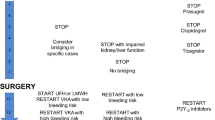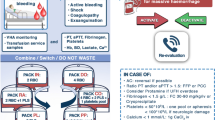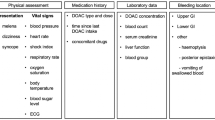Abstract
The objective was to describe the management and risk factors for complications of antiphospholipid syndrome (APS) patients who underwent a surgical procedure in a single center. We reviewed medical records of all patients with primary or secondary APS who underwent an elective surgery during a 6-year period. Demographical data, management of anticoagulation and complications were recorded. We identified 43 patients, mean age 37.9 ± 8.9 years, who underwent a total of 48 elective surgeries. All patients had history of at least one thrombotic event and were under vitamin K antagonists. Before surgery, all patients received bridging therapy with intravenous infusion of heparin or low molecular weight heparin (LMWH). Among the LMWH group, 36 had a full anticoagulation regimen and nine prophylactic doses. In 62% of the surgeries, we identified an optimal management of periprocedural anticoagulation according to guidelines. Overall six patients had severe bleeding and three thrombotic complications (full anticoagulation regimen n = 2 and prophylactic dose group n = 1). Patients with optimal management of anticoagulation experienced less thrombotic and hemorrhagic complications (7 vs. 33%; OR 0.14, 95% CI 0.02–0.81; p = 0.040) and patients with INR ≤1.5 at surgery had fewer episodes of major bleeding (6 vs. 29%; OR 0.19, 95% CI 0.02–0.98; p = 0.050). All three thrombotic events occurred in patients with INR ≤1.5. Proper management of anticoagulation based on guidelines is associated with less complications in patients with APS. Notwithstanding the proper use of bridging therapy, some patients may develop thrombotic complications.
Similar content being viewed by others
References
Comarmond C, Cacoub P (2013) Antiphospholipid syndrome: from pathogenesis to novel immunomodulatory therapies. Autoimmune Rev 12:752–757
Ruiz-Irastorza G, Crowther M, Branch W et al (2010) Antiphospholipid syndrome. Lancet 376:1498–1509
Douketis JD, Berger PB, Dunn AS (2008) The perioperative management of antithrombotic therapy: American College of Chest Physicians Evidence-Based Clinical Practice Guidelines (8th Edition). Chest 133:299–339
National Institute for Health and Clinical Excellence (NICE) (2010) CG92: Venous thromboembolism in adults admitted to hospital: reducing the risk, http://www.guidance.nice.org.uk/CG92/Guidance. Accessed May 2015
Akkara Veetil BM, Bongartz T (2011) Perioperative care for patients with rheumatic diseases. Nat Rev Rheumatol 8:32–41
Miyakis S, Lockshin MD, Atsumi T et al (2006) International consensus statement on an update of the classification criteria for definite antiphospholipid syndrome (APS). J Thromb Haemost 4:295–306
Charlson ME, Pompei P, Ales KL et al (1987) A new method of classifying prognostic comorbidity in longitudinal studies: development and validation. J Chronic Dis 40:373–383
Cabiedes J, Cabral AR, Alarcón-Segovia D (1995) Clinical manifestations of the antiphospholipid syndrome in patients with systemic lupus erythematosus associate more strongly with anti-b2-glycoprotein-I than with antiphospholipid antibodies. J Rheumatol 22:1899–1906
Pengo V (2012) ISTH guidelines on lupus anticoagulant testing. Thromb Res 13:76–77
Erdozain JG, Ruiz-Irastorza G, Segura MI et al (2012) Cardiac valve replacement in patients with antiphospholipid syndrome. Arthritis Care Res (Hoboken) 64:1256–1260
Raso S, Sciascia S, Kuzenko A et al (2015) Bridging therapy in antiphospholipid syndrome and antiphospholipid antibodies carriers: case series and review of the literature. Autoimmun Rev 14:36–42
Saunders KH, Erkan D, Lockshin MD (2014) Perioperative management of antiphospholipid antibody-positive patients. Curr Rheumatol Rep 16:426
Douketis JD, Spyropoulos AC, Kaatz S, Becker RC, Caprini JA, Dunn AS, Garcia DA, Jacobson A, Jaffer AK, Kong DF, Schulman S, Turpie AG, Hasselblad V, Ortel TL, BRIDGE Investigators (2015) Perioperative Bridging Anticoagulation in Patients with Atrial Fibrillation. N Engl J Med 373:823–833
Galli M, Finazzi G, Barbui T (1996) Thrombocytopenia in the antiphospholipid syndrome: pathophysiology, clinical relevance and treatment. Ann Med Interne 147(Suppl 1):24–27
Romero-Díaz J, García-Sosa I, Sánchez-Guerrero J (2009) Thrombosis in systemic lupus erythematosus and other autoimmune diseases of recent onset. J Rheumatol 36:68–75
Hernández-Molina G, Espericueta-Arriola G, Cabral AR (2013) The role of lupus anticoagulant and triple marker positivity as risk factors for rethrombosis in patients with primary antiphospholipid syndrome. Clin Exp Rheumatol 31:382–388
Pazzola G, Zuily S, Erkan D (2015) The challenge of bleeding in antiphospholipid antibody-positive patients. Curr Rheumatol Rep 17:7
Author information
Authors and Affiliations
Corresponding author
Ethics declarations
Ethical approval
The Institutional Review Board from our Institution approved this study.
Conflict of interest
Yemil Atisha-Fregoso, Eric Espejo-Poox, Eduardo Carrillo-Maravilla, Alma Lilia Pulido-Ramírez, Diego Lugo B, Gabriela Hernández-Molina and Antonio R. Cabral declare that they have no conflict of interest.
Funding
The study was funded with departmental resources.
Rights and permissions
About this article
Cite this article
Atisha-Fregoso, Y., Espejo-Poox, E., Carrillo-Maravilla, E. et al. Perioperative management of patients with antiphospholipid syndrome: a single-center experience. Rheumatol Int 37, 1159–1164 (2017). https://doi.org/10.1007/s00296-017-3727-0
Received:
Accepted:
Published:
Issue Date:
DOI: https://doi.org/10.1007/s00296-017-3727-0




